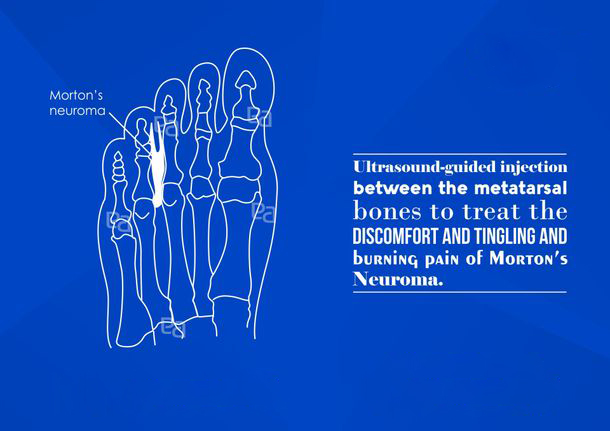

Treatments
HIP, KNEE & ANKLE PAIN

Morton’s Neuroma
What is Morton’s neuroma?
Morton's neuroma is a painful condition that affects the ball of your foot. It is caused by inflammation, thickening, or enlargement of the nerve between the bones of the foot.
Morton’s neuroma can cause sharp, stinging pain between the toes when standing or walking. It can, in addition, cause tingling sensation (pins and needles) and numbness in the toes and foot, and a sensation of having a pebble or a marble under the ball of the foot. Occasionally, there might be some swelling in the foot. When the diagnosis of Morton’s neuroma is made, an ultrasound-guided injection of medications close to the neuroma would help reduce the symptoms.
How is Morton’s neuroma injection performed and how long does the pain relief last?
At Atlas Pain Care, Coimbatore, you will be asked to change into a hospital gown and taken to our procedure room. Your foot will be cleaned with antiseptic solution and draped. The injection site is then identified using ultrasound guidance and a small amount of local anaesthetic is injected into the skin overlying the injection site to numb the skin. The medications are then given through a longer needle that has been positioned in the exact spot using ultrasound guidance. You may feel some discomfort during the injection, but this normally settles quickly. The whole procedure takes around 15 minutes. The pain relief from the injection usually lasts from few weeks to months. When the pain relief is good, but short-lived, pulsed radiofrequency lesioning of the neuroma is performed, where an electric needle is placed close to the neuroma under ultrasound guidance, and pulsed radiofrequency waves are sent to gently stun the nerve.
Morton’s neuroma injection should be supplemented with other conservative treatments including physical therapy, appropriate shoes with wide toe boxes, and orthotics for long-term benefit.
What are the risks of the procedure?
As with most procedures, there is a remote risk of bleeding, infection, nerve injury or allergic reaction to the medications used. Injection site pain/soreness is the most common complication, which is temporary.
Please read our FAQ section to know more about the do's and don'ts prior to and after the procedure.

